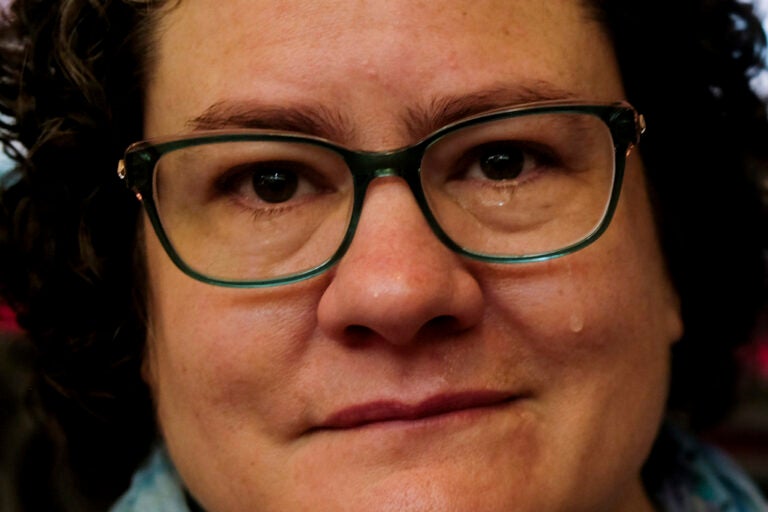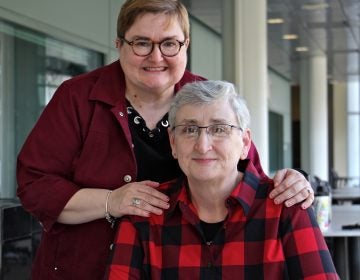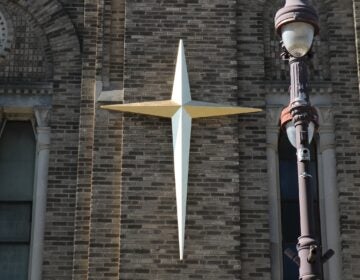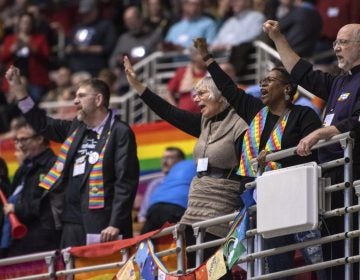A Methodist pastor was defrocked for telling her Philly congregation of her same-sex relationship. She’s now been reinstated
Beth Stroud was defrocked in 2004, but less than three weeks after the United Methodist Church repealed its anti-LGBTQ bans, she has been reinstated as pastor.

Beth Stroud sheds a tear pondering what reinstatement would mean 20 years after she was defrocked from her job as a United Methodist pastor in Philadelphia, Sunday, May 12, 2024, at Turning Point United Methodist Church in Trenton, N.J. Delegates at a United Methodist conference recently struck down longstanding anti-LGBTQ bans and created a path for clergy ousted because of them to seek reinstatement. (AP Photo/Luis Andres Henao)
Twenty years ago, Beth Stroud was defrocked as a United Methodist Church pastor after telling her Philadelphia congregation that she was in a committed same-sex relationship. On Tuesday night, less than three weeks after the UMC repealed its anti-LGBTQ bans, she was reinstated.
In a closed meeting of clergy from the UMC’s Eastern Pennsylvania region, Stroud exceeded the two-thirds vote requirement to be readmitted as a full member and pastor in the UMC.
Bishop John Schol of Eastern Pennsylvania welcomed the outcome, stating, “I’m grateful that the church has opened up to LGBTQ persons.”
Stroud was brought into the meeting room after the vote, overcome with emotion.
“I was completely disoriented,” she told The Associated Press via email. “For what felt like several minutes I couldn’t tell where the front of the room was, where I was, where I needed to go. Everyone was clapping and then they started singing. The bishop asked me quietly if I wanted to say anything and I said I couldn’t.”
She was handed the red stole that designates a fully ordained member of the clergy, and joined her colleagues in a procession into a worship service.
Earlier this month, delegates at a major UMC conference in Charlotte, North Carolina, struck down longstanding anti-LGBTQ policies and created a path for clergy ousted because of them to seek reinstatement.
Stroud — even while recalling how her 2004 ouster disrupted her life — chose that path, though some other past targets of UMC discipline chose otherwise.
At 54, Stroud doesn’t plan a return to full-time ministry — at least not immediately. Now completing a three-year stint teaching writing at Princeton University, she is excited to be starting a new job this summer as assistant professor of Christian history at the Methodist Theological School in Ohio — one of 13 seminaries run by the UMC.
Yet even with the new teaching job, Stroud wanted to regain the options available to an ordained minister as she looks for a congregation to join near the Delaware, Ohio, campus.
When Stroud finally made her decision, she knew it was the right one. But the decision did not come easily as she followed the UMC’s deliberations on the anti-LGBTQ policies.
“The first thing I felt was just anger — thinking about the life I could have had,” she told the AP at the time. “I loved being a pastor. I was good at it. With 20 more years of experience, I could have been very good — helped a lot of people and been very fulfilled.”
Instead of pastoring, she spent several years in graduate schools, while earning modest income in temporary, non-tenured academic jobs. There were challenges, including a bout with cancer and divorce from her wife, although they proceeded to co-parent their daughter, who was born in 2005.
Had she not been defrocked, Stroud said, “My whole life would have been different.”
The process that led to Stroud’s ouster began in April 2003, when she told her congregation, the First United Methodist Church of Germantown, about her same-sex relationship. The church — where Stroud had been a pastor for four years — set up a legal fund to assist with her defense and hired her as a lay minister after she was defrocked.
The UMC says it has no overall figures of how many clergy were defrocked for defying anti-LGBTQ bans or how many reinstatements might occur.

Get daily updates from WHYY News!
WHYY is your source for fact-based, in-depth journalism and information. As a nonprofit organization, we rely on financial support from readers like you. Please give today.






